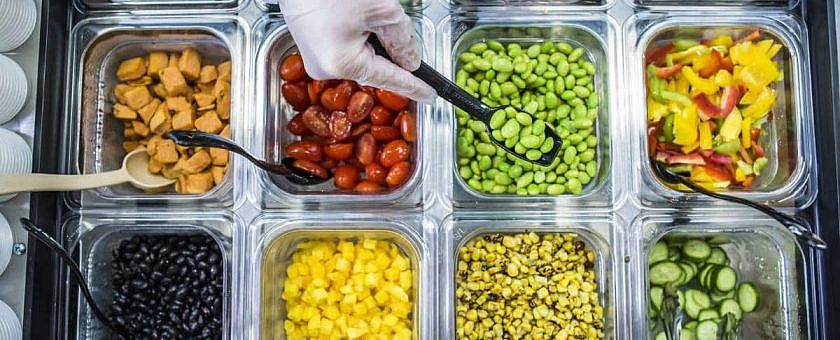
One Fast Casual’s Pursuit of Proprietary Tech
- posted in: Investment
Applications for the software go well beyond daily sales forecasts.
From: QSR Magazine
Cafe Zupas is leveraging bespoke AI tools to predict sales and improve margins.
Cafe Zupas prides itself on serving food that’s made from scratch daily. Its expansive menu of soups, salads, and sandwiches requires over 200 ingredients, with fresh produce being delivered daily.
“When you’re getting all of these different provisions, the spoilage rate is going to be very high, unless you have really good predictions,” says Wes Beaman, the 70-unit fast casual’s head of IT.
Maintaining that commitment to freshness and quality while running a profitable business is no easy task, especially for an emerging brand. Co-founders Dustin Schulthies and Rob Seely realized early on they needed tight operations to scale the business.
“People told them, ‘You can’t do this. You can’t bring that many fresh ingredients into a quick-service space and have them ready every day,’” Beaman says. “They came together and said, ‘I think we can solve this with technology.’”
Schulthies and Seely—both with software backgrounds—tapped Beaman to develop an in-house program that was custom-made to meet the needs of Cafe Zupas and its expansive menu. He started building the company’s proprietary tech stack 10 years ago and hasn’t looked back since.
“The first problem we faced was getting ordering right, so our team members could have a very simple process for doing inventory on the shelves, and then the system could automatically order for them,” he says.
Initially, Cafe Zupas relied on five-week rolling averages and a look back at historical data to come up with reasonable sales forecasts. Those traditional accounting methods proved insufficient as the footprint expanded, so Beaman and his team started using AI technology to augment the predictions in 2019. They developed software that takes into account upwards of 20 different attributes to predict sales down to 15-minute intervals on a store-by-store basis.
“Each store has its own unique demographics, ordering behaviors, menu mix, and things like that,” Beaman says. “We had to create a model that is self-learning, that evaluates per-store what the best projection model will be, and that automatically adjusts the micro-tuning parameters based on each store’s makeup. It looks at things like the weather, sales trends, and any local events that are going on that could impact sales. It also looks at what we’re doing intraday. If we’re having a really good sales day, or if we’re running a promotion that’s doing better than expected, it will automatically make those adjustments on the fly.”
Applications for the software go well beyond daily sales forecasts. Cafe Zupas has integrated AI projection models into nearly every aspect of the business. The proprietary platform keeps track of inventory and tells employees which ingredients and quantities they need to prepare in the morning as well as in the afternoon after the lunch shift. It automatically prints out expiration stickers. Product orders for produce and dry goods also are automated using AI projection models. Once a week, the system automatically builds a schedule for team members.
“Store leaders will say things like, ‘It used to take me four hours to count my inventory each week. Your approach takes me a few minutes, and it’s more accurate,’” says CMO JP Knab. “These systems are so easy to use that the managers can focus on training their staff and interacting with guests, instead of putting so many hours into getting all the details around inventory and spoilage correct.”
The proprietary tech stack was a major draw for Knab, who joined Cafe Zupas from Overstock.com earlier this year. He was impressed by the way those back-of-house efficiencies enhance overall employee satisfaction and translate directly into an improved customer experience.
“A lot of the reason why so many quick-service restaurant experiences are negative is because you have a team that is frustrated or overwhelmed,” Knab says. “They’re not getting the shifts they want. The food prep isn’t as easy as it should be. I think having these really simple systems is why people walk into a Zupas and get a friendly interaction. It’s because all of these things are running so well on the back end.”
The DIY ethos extends to the chain’s consumer-facing technology, too.
Cafe Zupas recently launched a re-vamped website, online ordering portal, and app.
“One of the things we had to solve for is the fact that those 200-plus ingredients end up being quite a few main menu items,” Knab says. “When you’re taking all of those ingredients down to dozens of different menu items and hundreds of combinations, and you’ve got people that are customizing their orders, it still has to come out as really simple to the customer. Wes and his team are coding all of those experiences themselves. The end result is really clean looking and easy to use, even though there’s a lot of menu complexity.”
The IT team also recently released a selection of loyalty tools, and it’s working on applying more AI technology to facilitate one-to-one personalized communications with guests.
The custom tech takes longer to build, but the costs for off-the-shelf tools and the ones Cafe Zupas built for itself are comparable.
There could be some economies of scale as the company grows, since companies typically pay by restaurant for off-the-shelf products, but Beaman says the company would’ve taken the same approach regardless of the cost.
“That wasn’t our guiding principle,” he says. “The goal is to provide an excellent customer experience to our guests and make things as simple as possible for our team.”
